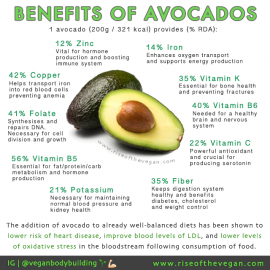
10 reasons you need more avocados in your life!
Creamy, rich and flavorful, avocados are a delicious fruit that bring many health benefits, and can be enjoyed on their own or in many dishes. Although avocados have a high fat content, this isn't a problem when consumed as part of a balanced diet - your body requires healthy fats to function properly, and what better way to consume heart-healthy fats than by eating avocados as they are absolutely packed with nutrients bringing many other health benefits.
- Lower Risk of Cancer
A 2007 study found that the phytochemicals in avocados encourage cancer cells to stop growing and die. Avocados are rich in cancer-fighting carotenoids, which are most plentiful in the dark-green portion of the flesh that’s closest to the skin. - Blood Pressure Regulation
Avocado's relatively high levels of potassium can help keep blood pressure under control. This is because potassium balances the effects of sodium (table salt), which can increase your blood pressure, and 200g of avocado contains 21% RDA potassium. - Maintain a Healthy Heart
A high level of homocysteine is associated with a higher risk of heart disease, but Vitamin B6 and Folic Acid found in avocados help to regulate it.
Avocados are high in monounsaturated and polyunsaturated fats, which may help reduce blood cholesterol levels and decrease the risk of heart disease.
A seven-year study published in 2013 in Nutrition Journal found that eating avocados was associated with a reduced risk of metabolic syndrome, a group of symptoms shown to increase the risk of diabetes, stroke and cardiovascular disease. - Healthy Skin
The Vitamin C and Vitamin E in avocados helps keep skin looking nourished and healthy. Vitamin E acts as an antioxident to neautralise the oxidative effect of free radicals and can slow down the skin-aging process. Avocado (and avocado oil in particular) may even be useful in treating psoriasis.
- Lower Bad Cholesterol
Avocados not only lower bad cholesterol, they also increase levels of good cholesterol. A 1996 study found that patients with high cholesterol who incorporated avocados into their diet for a week had a 22% decrease in bad cholesterol and triglycerides and an 11% increase in good cholesterol. Avocados were also found to improve cholesterol for people who already had good lipid levels, but were shown to be especially effective in those with mild cholesterol problems. Avocados contain beta-sitosterol compound, which is associated with lowering cholesterol. - Blood Sugar Regulation
The high levels of monounsaturated fats in avocados can help stop insulin resistance, which helps to regulate blood sugar levels. The high amount of soluble fiber in avocados helps maintain stable blood sugar levels. Compared to other fruits, the low carbohydrate and sugar levels in avocados also help in not raising blood sugar in the first place. - Improved Digestion
The fiber in avocados helps keep food moving through the digestive system, encouraging regular bowel movements and healthy intestines. - Maintain Healthy Eyes
Avocados are an excellent source of the carotenoid lutein, which reduces the risk of macular degeneration and cataracts. The Intake of fat from the avocado along with carotenoids greatly helps to improve their absorption. - Boost your Immune System
Avocados are a good source of Glutathione - a powerful antioxidant associated with immune system health, needed for the lymphoid cells. - Pregnancy and Healthy Babies
Avocados contain plenty of folic acid, which is essential for preventing birth defects of the brain and spinal cord.
Healthy Fats
Avocados have a high fat content of around 80% of their total calories—about 20 times the average for other fruits. A typical avocado contains 30g of fat, but 20 of these fat grams are health-promoting monounsaturated fats such as oleic acid.

Phytonutrient content
Avocados contain an amazing array of important phytonutrients. Included are phytosterols (especially beta-sitosterol, stigmasterol, and campesterol); carotenoids (beta-carotene, alpha-carotene, lutein, neochrome, neoxanthin, chrysanthemaxanthin, beta-cryptoxanthin, zeaxanthin, and violaxanthin); flavonoids (epicatechin and epigallocatechin 3-0-gallate); and polyhydroxylated fatty alcohols. Alpha-linolenic acid (an omega-3 fatty acid) and oleic acid are key fats provided by avocado.
Subscribe!
Love this content?
Receive our awesome newsletter straight to your Inbox!

 Your email address will always stay private.
Your email address will always stay private.





















Comments